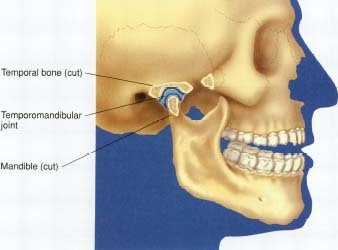What Is TMJ?
Technically, TMJ stands for temporomandibular joint, or jaw joint, one of which is located on each side of the head. These joints are where the lower jaw, or mandible (MAN-di-bul), meets the temporal (TEM-po-ral) bone, which is one of a pair of bones that form the lower part of the
 Each temporomandibular joint acts as both a hinge and a gliding joint; they allow the jaw to open and to slide from side to side.TMJ also refers to temporomandibular joint syndrome (or disorder), in which the joints do not function properly. This may cause pain, difficulty opening and closing the mouth easily, or problems with chewing and swallowing, as well as other symptoms.
Each temporomandibular joint acts as both a hinge and a gliding joint; they allow the jaw to open and to slide from side to side.TMJ also refers to temporomandibular joint syndrome (or disorder), in which the joints do not function properly. This may cause pain, difficulty opening and closing the mouth easily, or problems with chewing and swallowing, as well as other symptoms.
Hot compresses and over-the-counter pain medications may help relieve TMJ. Stress management and mouth guards worn at night can help eliminate teeth grinding and its effects.
Side view of a temporomandibular joint.

What Are the Causes of TMJ?
TMJ can be caused by dislocated temporomandibular joints or by inherited problems with the joints. In a condition called bruxism (BRUK-siz-um), some people grind their teeth during sleep or times of stress, which can lead to TMJ. Malocclusion, when teeth do not fit together properly; whiplash injuries * from car accidents; being hit on the head or jaw; and arthritis * are other causes of TMJ.What Are the Symptoms of TMJ?
Since the TMJ joint is located near many important nerves going between the brain and many parts of the body, the symptoms can be felt in parts of the body that do not seem related to the TMJ joint. Millions of Americans report some of the following symptoms:- Frequent headaches
- Pain in the face, sinuses, ears, eyes, teeth, neck, and back
- Clicking sounds in the jaw
- Difficulty in opening or closing the mouth
- Trouble chewing or swallowing
How Is TMJ Diagnosed and Treated?
Doctors or dentists will ask the patient to describe the symptoms and will then examine the patient. Sometimes, x-rays and MRIs * are used to examine the joints to diagnose TMJ.Hot compresses and over-the-counter pain medications may help relieve TMJ. Stress management and mouth guards worn at night can help eliminate teeth grinding and its effects.
* whiplash injuries describe general injuries to the spine and spinal cord at the junction of the fourth and fifth vertebrae in the neck occurring as a result of rapid acceleration or deceleration of the body.
* arthritis refers to any of several disorders characterized by inflammation of the joints.
* MRI, which is short for magnetic resonance imaging, produces computerized images of internal body tissues based on the magnetic properties of atoms within the body.
Ask Dr. Boscken if you have any signs or symptoms which concern you. We are happy to guide you in resolving concerns!
* arthritis refers to any of several disorders characterized by inflammation of the joints.
* MRI, which is short for magnetic resonance imaging, produces computerized images of internal body tissues based on the magnetic properties of atoms within the body.
Ask Dr. Boscken if you have any signs or symptoms which concern you. We are happy to guide you in resolving concerns!

No comments:
Post a Comment